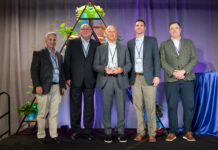Pictured above: Tennessee Tech alumna Rosa Vásquez Espinoza.
Television personality dedicated her career to promoting conservation and sustainability in the Amazon rainforest
Rosa Vásquez Espinoza is a woman on a mission. The Peruvian-born chemical biologist, National Geographic explorer, television personality and nonprofit founder has dedicated her career to promoting conservation and sustainability in the Amazon rainforest.
These days, you can find Espinoza featured in the New York Times for her research on the Amazon region’s stingless bees, profiled in Marie Claire U.K. as a champion for “female empowerment in science,” ranked among an elite list of “50 people changing the world” by The Explorers Club and even beamed into living rooms everywhere as a presenter on the Science Channel documentary series “Secrets in the Jungle.”
But before becoming a world-renowned scientist and advocate, Espinoza was making her way in Cookeville as a student at Tennessee Tech University.
“Tennessee Tech felt like a family away from home, and that felt like a very safe space for me to explore any question that came to my mind,” said Espinoza on a recent episode of Tech’s “College Town Talk” podcast.
The 2015 Tech graduate acknowledges she considered many universities for her studies but was drawn to Tech for its “welcoming international program.”
“I had never been to Tennessee,” Espinoza recalled. “I didn’t know what [Tech] would be like, but I just kind of went with a hunch that it seemed so organized and welcoming.”
While Espinoza’s chosen fields of study – biochemistry and molecular biology – would be challenging enough for anyone, she decided to push herself further through Tech Honors, the university’s honors program curriculum. She would find a trusted mentor in Tech Honors director Rita Barnes.
“I genuinely enjoyed the honors program and Dr. Barnes was such a big part of it,” said Espinoza.
For Barnes, the admiration was mutual.
“Rosa, from the time she came in, was very self-possessed and very receptive to suggestions, but at the same time was clearly her own person,” said Barnes.
Barnes went on to recall Espinoza’s leadership as co-chair of the service committee for the Tech Honors student organization, the Associated Scholars Guild. Espinoza used her passion for salsa dance to teach a two-semester-long series of salsa classes for individuals with neurological challenges.
She enlisted the help of her committee members by teaching them salsa first.
“To this day, we use that as a model when we talk to students about civic engagement and helping them be alive to what they care about,” said Barnes.
Years after Espinoza’s graduation in cursu honorum (“in the course of honors”) from Tech, Barnes continues to keep in touch. She even watched via Zoom when Espinoza defended her dissertation for a Ph.D. from the University of Michigan.
Likewise, Charles Wilkerson, director of international recruitment and admission at Tech, praised Espinoza for being “always generous with the other students.”
Wilkerson recalled Espinoza’s time spent teaching exercise classes on campus, including female-only classes that allowed other international peers to work out without the need for a hijab or abaya.
“I was so proud of her,” Wilkerson added.
Today, Espinoza is still teaching – but in a different way, and with a greater sense of urgency.
As a National Geographic Explorer traveling to some of the planet’s most extreme environments, and as the founder and executive director of the nonprofit Amazon Research Internacional, Espinoza says time is of the essence when it comes to protecting Amazonian lands, species and other natural resources.
“I don’t think there’s that much time for our rainforest, really,” Espinoza warns. “And I think more people are getting to see that, but in a hopeful way. That is my mission, not bring another ‘gloom and doom’ type of perspective, but rather saying that there is hope.”
The thing that gives Espinoza the greatest optimism, she explains, is today’s students and young adults.
“I get to work with a lot of classrooms and see how these newer generations are growing with the worst impacts of climate change,” said Espinoza. “But they have so much more hope than perhaps the media sometimes shows. I think that just gives me the energy to keep working for this mission.”
As Espinoza looks to the work ahead of her, she says she feels gratitude for the strong foundation that Tech provided, including the guidance she received from faculty like her research mentor, David Beck, associate professor of biology.
“I think that has been the biggest positive impact that I’ve gotten from Tennessee Tech … helping me build the confidence to take on the work that we do now,” Espinoza concluded.
Listen to Espinoza’s full “College Town Talk” interview on Spotify, Apple Podcasts, Google Podcasts, Pandora and other platforms. Learn more about her work at www.rosavespinoza.com.
Photo by Stephanie King.
Other stories you may want to check out:









